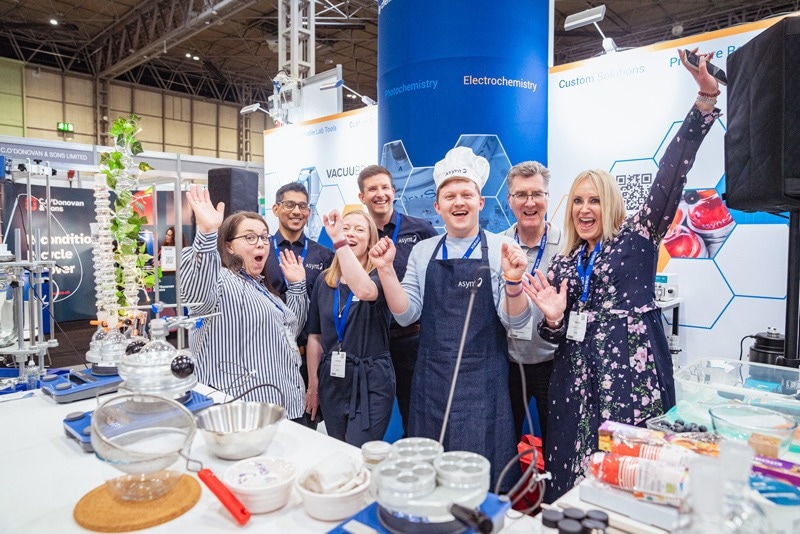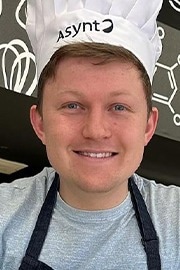From AsyntReviewed by Louis CastelSep 2 2024
In this interview, Asynt talks to Leicester University's Josh Smalley about his Science Kitchen and his efforts to introduce chemistry to his students via baking. Asynt, a global provider of world-leading technologies and services, provides solutions that cater to both industry and academia. Asynt’s commitment to innovation and sustainability aligns with Josh's Science Kitchen goals, making this collaboration particularly exciting.
Could you tell us a bit about your chemistry/baking background and your current role at Leicester University?
I have always had a passion for chemistry, inspired by a motivational A-level teacher and a family background steeped in the field. My parents worked for the NHS for over 35 years, and my uncle and cousin both have PhDs in chemistry.
This family influence led me to pursue a Master's in Pharmaceutical Chemistry and later a Ph.D. in Chemical Biology at the University of Leicester, where I now work as a postdoctoral researcher.
My research initially focused on designing and synthesizing PROTACs (proteolysis targeting chimeras) for the selective degradation of enzymes. The COVID-19 pandemic interrupted my Ph.D., but I continued to complete it and participated in Bake Off during that time.
This experience and my love for teaching led to my new role as Science Communication Champion at the University of Leicester. In this role, I connect chemistry with everyday life, particularly through baking, to engage the public and younger generations.

Image Credit: Asynt
What are your plans for your Science Kitchen going forward?
The Science Kitchen began as a dream but quickly became a reality. It is designed to make chemistry accessible and exciting by connecting it with food and baking. We host live events, webinars, and demonstrations that show how chemistry is present in everyday activities like baking a cake.
For example, at a recent university open day, I demonstrated how to make mini-baked Alaskas, explaining the chemistry behind each step, from the rise of the sponge to the Maillard reaction when torching the meringue. These activities bridge the gap between college practicals and university lab work, making chemistry more relatable and less intimidating.
Could you tell us why sustainability is important in the lab?
Sustainability is crucial in today’s scientific research. At a recent NEC demonstration, we used Asynt's DrySyn heating blocks and CondenSyn waterless condensers, the key to promoting safer and more sustainable lab practices. These tools, developed by chemists for chemists, reduce the need for hazardous materials like hot oil baths and eliminate water wastage, making our research processes more environmentally friendly.
How does CondenSyn work, and what makes it an effective tool for waterless condensing or distillation?
CondenSyn is an innovative tool that enables waterless condensation. It captures evaporated solvent within the glassware and condenses it back down without needing a water jacket.
This feature was particularly useful when infusing cream with various flavorings in the Science Kitchen. The controlled environment provided by the CondenSyn and DrySyn setup allowed us to maintain precision without constant monitoring, making it ideal for lab work and culinary experiments.
How does DrySyn and CondenSyn’s ease of use enhance the overall lab experience, especially in teaching environments?
From my experience in the Science Kitchen, DrySyn and CondenSyn’s ease of use has been very beneficial for introducing students to equipment they might not have encountered in their college labs. It is an excellent opportunity to explain what this equipment does, its components, and its importance.
This state-of-the-art equipment, such as the DrySyns that replace hot oil baths and the stirrer plate with controlled heat and stirring functions, is particularly novel for many students.
Presenting this equipment in a friendly, non-laboratory environment makes it easier for students to engage with and understand its applications. The positive feedback that we received also indicates that students are excited about using this equipment in their chemistry labs, and it has been a valuable addition to their learning experience.
How do you think incorporating tools like DrySyn and CondenSyn into teaching labs influences students' perspectives on sustainable chemistry?
Introducing students to these tools in a teaching environment has been incredibly beneficial. They learn about cutting-edge equipment and gain an appreciation for sustainable practices in chemistry.
Seeing how tools like CondenSyn enable reflux reactions without water jackets or how DrySyn replaces hot oil baths helps them understand the importance of sustainability in research.
Looking ahead, what are your hopes for the future of sustainable lab practices and the Science Kitchen?
I hope to continue exploring sustainable practices in the lab and the kitchen. The Science Kitchen has gained significant interest, and I am excited to see how it will grow. By showing how chemistry is integral to everyday life and making it more accessible, I believe we can inspire more people to pursue careers in STEM.

About the Speaker
Dr. Josh Smalley is a multi-talented professional with a doctorate in chemistry who also happens to be an outstanding baker, gardener, and chemical biologist. His baking prowess entered the public conscious after competing in the 14th series of The Great British Bake Off. His outstanding baking skills and painstaking attention to detail won him a place in the finale.

This information has been sourced, reviewed and adapted from materials provided by Asynt.
For more information on this source, please visit Asynt.
Disclaimer: The views expressed here are those of the interviewee and do not necessarily represent the views of AZoM.com Limited (T/A) AZoNetwork, the owner and operator of this website. This disclaimer forms part of the Terms and Conditions of use of this website.